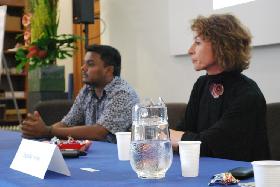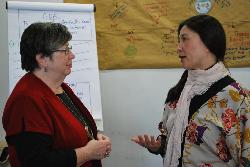Ten years after the initiation of the Arigatou International ethics education initiative, an International Seminar was arranged to celebrate the achievments and thank all involed but also to solicit input for the direction and strategies for the next decade of ethics education for children from an interfaith perspective
 Arigatou International opened an office in Geneva in 2003 to coordinate the interfaith-based ethics education global initiative. Educators, teachers, parents, youth leaders and young people, religious and community leaders, UN agencies, such as UNICEF and UNESCO, have throughout the last decade been engaged in crafting, implementing and promoting the pedagogy and approach underlying the Learning to Live Together manual. This intercultural and interfaith-based ethics education programme attempts at nurturing children’s ethical values by helping them strengthen their identities and critical thinking, build constructive relations with others, and work collectively towards positive change. The ethical imperative that guides the pedagogical approach in interfaith-based ethics education should be employed when working to protect children from violence, to prevent children from living in poverty and to safeguard the environment.
Arigatou International opened an office in Geneva in 2003 to coordinate the interfaith-based ethics education global initiative. Educators, teachers, parents, youth leaders and young people, religious and community leaders, UN agencies, such as UNICEF and UNESCO, have throughout the last decade been engaged in crafting, implementing and promoting the pedagogy and approach underlying the Learning to Live Together manual. This intercultural and interfaith-based ethics education programme attempts at nurturing children’s ethical values by helping them strengthen their identities and critical thinking, build constructive relations with others, and work collectively towards positive change. The ethical imperative that guides the pedagogical approach in interfaith-based ethics education should be employed when working to protect children from violence, to prevent children from living in poverty and to safeguard the environment.
Since its publication, Learning to Live Together has been distributed widely, and has been promoted through national and regional training workshops organised mostly by the GNRC – often in collaboration with the Arigatou International Geneva – and through promotional events arranged in cooperation with UNICEF and UNESCO.
Ten years of hard work and commitment by those engaged in and supporting this interfaith-based ethics education initiative is worth giving thanks for, not least because we see it as an agent of change and a tool for impacting the lives of children. This is worth celebrating. But we need to go further. Building on the investment made, networks already established and results so far achieved in the last ten years, prove that this global initiative needs to continue to shape the way children live with each other in the different and complex plural societies, serving as the tool for development it has already proven to be.
 In consultation with various stakeholders we explored during the two day Seminar how ethics education can influence the crafting and future implementation of the UN Post – 2015 development agenda as well as other ongoing global initiatives on child survival and development. The deliberations focused on two emerging issues: Strengthening family systems through ethics education and Ethics Education and Global Citizenship.
In consultation with various stakeholders we explored during the two day Seminar how ethics education can influence the crafting and future implementation of the UN Post – 2015 development agenda as well as other ongoing global initiatives on child survival and development. The deliberations focused on two emerging issues: Strengthening family systems through ethics education and Ethics Education and Global Citizenship.
Friends and supporters, experts and practitioners in ethics education were invited to come together to help us design the agenda for the next decade of ethics education under the following objectives:
a) To celebrate the achievements of 10 years of dedicated work to promote throughout the world the Arigatou International interfaith-based ethics education initiative;
b) To demonstrate the value that faith-based organizations can add to implement this global initiative through programmes and/or activities at country level;
c) To review outcomes, good practices, lessons learned and the impact of the 10-year global initiative;
d) To discuss and propose ideas for exploring the feasibility, content and desired outcomes of a second decade on interfaith-based ethics education, with a particular emphasis on child survival and development, including the strengthening of family systems as seen from an ethics education perspective;
e) To identify guiding principles and expected outcomes for a second decade on interfaith-based ethics education.
A summary of the deliberations will soon be available on our website. The Interfaith Council on Ethics Education will convene in the beginning of the autumn to follow up on the outcomes and design stategies and an action plan for the continued work.